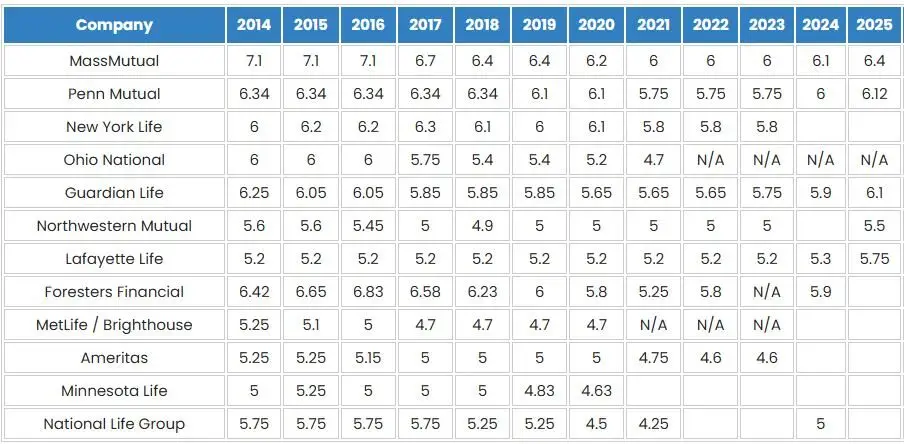While many people purchase whole life insurance for the death benefit, the additional features offered by mutual life insurance companies make these flexible financial vehicles particularly attractive. With permanent dividend paying whole life insurance policies, you gain access to a cash value account where funds grow on a tax-deferred basis.
This cash value accumulation serves as an additional retirement savings vehicle and source of liquidity for emergencies, higher-interest debt payoff, or supplementing retirement income. In times of economic uncertainty and changing interest rates, mutual insurance companies have demonstrated remarkable resilience compared to their stock company counterparts.
Understanding the pros and cons of whole life insurance policies is crucial because not all policies or insurance companies are created equal. This guide will help you navigate the different categories of insurers, their performance in 2024, and why one may be more beneficial than another for your financial goals.
Table of Contents
- Mutual vs. Stock Insurance Companies: Key Differences
- Stock Insurance Companies Explained
- Mutual Insurance Companies: Policyholder Ownership
- Side-by-Side Comparison: Mutual vs. Stock Companies
- Top 8 Mutual Life Insurance Companies in 2025
- Dividend Rate Comparison
- Mutual Insurance Performance During Economic Uncertainty
- Digital Transformation in Mutual Insurance
- How to Customize a Whole Life Insurance Strategy
Mutual vs. Stock Insurance Companies: Key Differences
Most whole life insurance companies are categorized as either stock or mutual insurers (with a few exceptions called fraternal insurers). These categories depend on the company’s ownership structure. Both stock and mutual insurance companies earn income by collecting premiums from policyholders, but their investing strategies and priorities can differ significantly.
Stock Insurance Companies
Stock insurance companies are “owned” by their stockholders. A stock insurer may earmark its profits to pay off debt and/or to reinvest in the company. Like companies in other industries, a primary goal of stock life insurance companies is to generate profit for their shareholders.
As such, stock insurers tend to have more focus on shorter-term results with higher-yielding – and oftentimes potentially riskier – assets. In stock insurers, the customers (policyholders) do not share directly in profits or losses attained by the company.
There are more stock insurance companies at this time than mutual insurers in the United States. Some of these stock companies include:
- MetLife
- Prudential
- Allstate
- Ohio National
There are pros and cons to stock insurance companies. Some benefits include:
- Their ability to raise money quickly. When a stock insurance company needs capital, it can typically just issue more shares of stock.
- These insurers are oftentimes able to “unlock” value and access new sources of capital. This can make it easier to fund rapid growth.
- Source
On the downside, however, stock insurers do not always put their customers’ (policyholders’) interests first. Rather, they are generally in business to cater to their stockholders – who are a significant source of capital for the companies.
As a policyholder of a stock insurance company, you won’t receive policy dividends like you could through a mutual insurer. These dividends instead are paid out to the company’s stockholders.
Mutual Insurance Companies
Mutual insurance companies are essentially owned by their policyholders. That means that policyholders have a right to vote on the board of directors, as well as to share in the company’s profits. In fact, the sole purpose of mutual insurance companies is to provide insurance coverage for its policyholder members.
The first mutuals came about in the late 17th century in England. Benjamin Franklin established the Philadelphia Contributionship for the Insurance of Houses From Loss by Fire as the first U.S. mutual insurer in 1752.
These types of insurers invest in portfolios that may contain mutual funds. The profits that are returned to policyholders of mutual whole life insurance companies can come in the form of dividends or reduction in policy premiums.
Not all policies offered by mutual insurance companies pay dividends to policyholders. While dividends are never guaranteed, permanent participating policies – often referred to as “par” policies – allow policyholders to participate in the profits of the insurance company.
There are several different ways that dividends from a whole life insurance policy may be received, including:
- Direct cash payment
- An addition to the cash value of the policy (which can add to the tax-deferred growth in the account)
- As payment to purchase additional paid-up life insurance coverage
Because mutual insurance companies are not traded on stock exchanges, they do not have to be as “aggressive” about reaching short-term profit targets for shareholders. With that in mind, mutual insurers can instead focus more on attaining longer-term benefits by investing in less risky assets.
Unlike stock insurance companies, mutual insurers are not listed on stock exchanges. However, should a mutual company convert to being a stock company – in a process known as “demutualization” – that could change. Federal law determines whether an insurance company may be a mutual insurer.
THE ULTIMATE FREE DOWNLOAD
The Self Banking Blueprint
A Modern Approach To The Infinite Banking Concept

Mutual versus Stock Life Insurance Companies
Ownership Structure
Voting Rights
Capital Raising Methods
Dividend Distribution
Investment Strategy
Profit Sharing
Top 8 Mutual Life Insurance Companies in 2025
Although some mutual whole life insurance companies have “demutualized” over the past couple of decades, there are still many large, financially stable mutual life insurance companies in the marketplace. Many of these have been in the industry for more than a century and have a long history of paying out consistent dividends to policyholders throughout the years.
Based on 2023-2024 financial data, ratings, and dividend performance, here are the top mutual insurers operating in the United States:
New York Life Insurance Company
The Guardian Life Insurance Company of America
Northwestern Mutual

Today, Northwestern Mutual is considered the leader among mutual insurers, having paid an impressive $8.2 billion in dividends to policyholders in 2025 – more than any other mutual company. The company continues to demonstrate its financial strength with consistent dividend payments, even amidst economic uncertainty.
This mutual whole life insurance provider is considered to be among the strongest in terms of financial stability and has earned the highest financial strength ratings awarded to any U.S. life insurers by all major ratings agencies:
Financial Strength Ratings for Northwestern Mutual
Northwestern Mutual has also earned numerous awards and recognition. It is a Fortune 500 Company, has been named one of the “World’s Most Admired Companies” in its industry according to FORTUNE Magazine, and ranks #90 on the Fortune 500 list of America’s premier companies.
The products offered through Northwestern Mutual include:
- Life Insurance
- Disability Insurance
- Long-Term Care Insurance
- Income Annuities (Fixed and Variable)
- Investments
- Private Wealth Management
- Advisory Programs
- Private Client Services
As a mutual whole life insurance provider, Northwestern Mutual focuses on its policyholders. Over the past century, the company has averaged 5.8% on its dividend interest rate, which is declared annually by its Board of Trustees.
In 2025, the company continues to emphasize cash value growth and tax-deferred benefits for retirement planning, making its whole life products particularly attractive in the current economic environment with higher interest rates improving investment income.
New York Life Insurance Company

As of 2024, New York Life reported total assets exceeding $400 billion and maintains over $1 trillion in life insurance in force. The company has demonstrated resilience during the recent economic uncertainties by prioritizing policyholder benefits over profitability.
Products and services available through New York Life include:
- Life Insurance (term life, whole life, universal life, and variable universal life)
- Long-term care insurance
- Annuities
- Supplemental disability insurance
- Mutual funds
- ETFs (Exchange traded funds)
- 529 college savings plans
- Estate planning
- Wealth management
- Employee benefits and other types of protection for businesses
New York Life Insurance Company and its subsidiaries have earned the highest financial strength ratings currently awarded to any life insurer by the major rating agencies.
NY Life Ratings
New York Life has declared an estimated dividend of $2.5 billion for 2025. Although dividends are not guaranteed, this represents the 171st consecutive year that the New York Life Board of Directors has declared a dividend, demonstrating the company’s commitment to policyholders even during challenging economic periods.
The company has paid in excess of $1 billion in dividends to its whole life insurance clients every year since 1990, and more than $44 billion in total dividend payouts over that time. Even through the recent COVID-19 pandemic and subsequent economic challenges, New York Life Insurance Company has maintained a position of incredible strength, due in large part to its focused business strategy, long-term investment perspective, and resolute commitment to mutuality.
Want to see how a mutual life insurance policy could benefit your financial strategy? Our experts offer complimentary consultations to help you explore your options.
MassMutual

MassMutual offers competitive dividend-paying policies with strong financial ratings supporting stability. The company reported a dividend payout of $2.5 billion in 2025, representing stable growth compared to previous years. Their focus on long-term financial planning and stability continues to attract customers looking for security in uncertain economic times.
MassMutual offers a wide range of financial products and services, including:
- Life Insurance (term, whole life, universal life, and variable universal life insurance coverage)
- Disability income insurance
- Long-term care coverage (as well as combination life insurance / long-term care)
- Annuities (fixed, indexed, and variable annuities)
- Individual Retirement Accounts
- Mutual Funds
- Exchange Traded Funds (ETFs)
- Unit Investment Trusts (UITs)
- 529 College Savings Plans
- Advisory and Trust Services
Although they are not guaranteed, MassMutual has paid out whole life insurance dividends to its eligible participating policyholders every year since 1869. The company has a strong dividend history with a 15-year average dividend payout of over 7%.
MassMutual is considered strong and stable by the insurer ratings agencies and is also ranked on the Fortune 500 list.
MassMutual Financial Strength Ratings
The Guardian Life Insurance Company of America

Guardian Life’s whole life policies are noted for their flexibility and robust cash value accumulation. In 2025, the company continued its tradition of policyholder dividends with a payout of $1.6 billion, demonstrating stability during economic volatility.
Guardian Life offers a wide range of different products and services, such as:
- Life Insurance
- Disability Insurance
- Dental Insurance
- Vision Insurance
- Accident Insurance
- Critical Illness Insurance
- Cancer Insurance
- Hospital Indemnity Coverage
- Annuities
- IRAs (Individual Retirement Accounts)
- Investments / Brokerage Accounts
As a mutual whole life insurance provider, Guardian Life is owned by its policyholders, so the insurer is not accountable to stockholders and other outside investors. Rather, it rewards its qualified policyholders by paying out dividends, which it has done consistently throughout its history.
The company has approximately $722 billion of life insurance in force, including whole life insurance. Given its extremely stable foundation, The Guardian is strong in terms of its financial strength ratings:
The Guardian Life Insurance Company’s Financial Strength Ratings
The company’s focus on helping to prepare its customers for the future has been a key driver for the Guardian to deliver outstanding results, as well as to continue providing excellent customer service.
Penn Mutual Life Insurance Company

Penn Mutual is praised for high Comdex scores and consistent dividend payments. The company maintained its strong dividend rate of 6.12% in 2025, reflecting its steady financial position despite market fluctuations. Penn Mutual is particularly noted for efficient claims processing, contributing to its high consumer satisfaction scores.
There are a number of insurance and financial product offerings available through Penn Mutual, including:
- Whole life insurance
- Survivorship whole life
- Indexed universal life
- Survivorship indexed universal life
- Variable universal life / Protection universal life
- Guaranteed universal life
- Current assumption universal life
- Convertible term life
- Non-convertible term life
- Variable annuities
- Fixed annuities
- Single premium immediate annuities (SPIAs)
- Indexed annuities
Penn Mutual is considered to be strong and stable financially and it has a good reputation for paying out its policyholders’ claims. This is reflected in the high ratings the company has received from the rating agencies.
Penn Mutual Life Insurance Company Ratings
Foresters Financial Insurance Company

Today, the company has approximately 3 million clients and members in the United States and Canada, as well as in the United Kingdom. Throughout the past century and a half, Foresters Financial has remained true to its commitment to help improve family wellbeing.
With that in mind, every year the company invests millions of dollars that go towards supporting causes that enrich the lives of families and communities.
Products that are offered through Foresters include the following:
- Term life insurance
- Whole life insurance
- Universal life insurance
Foresters is known for its strong financial foundation, as well as its positive reputation for being there when policyholders and beneficiaries are ready to make good on their claims. Due in large part to these factors, the company has earned a financial strength rating of A from A.M. Best.
Ever since the year 1874, Foresters has had a history of regularly paying a dividend to its policyholders. Even during years of uncertainty, this mutual whole life insurance provider has continued to “reward” its policyholders/owners with the continuation of dividend payments.
Looking for a mutual life insurer with a strong community focus? Let our experts help you find the right policy for your values and financial goals.
Lafayette Life
For more than 115 years, The Lafayette Life Insurance Company has provided life insurance, annuity, retirement and business planning solutions to individuals, families, and small to medium sized businesses.
The products and financial vehicles that are offered through Lafayette Life include both term and whole life insurance policies, as well as immediate and fixed indexed annuities.
Lafayette Life is a member of Western & Southern Financial Group, a Cincinnati-based diversified family of financial services companies. Initially started in 1905, the company is today on the Fortune 500 list.
Lafayette Life is built on a good, solid foundation of financial strength, along with offering quality products and services, as well as a commitment to excellence. For year-end 2025, the company maintained its strong financial position, paying out 123.3 million in dividend payments to policyholders at a 5.75% dividend rate.
Because it is there when its policyholders and beneficiaries need this company, Lafayette Life has earned high ratings from the insurer ratings agencies:
The Lafayette Life Insurance Company Financial Strength Ratings
In keeping with the company’s tradition of paying out dividends on its whole life policies – which it has done consistently since its founding in 1905 – Lafayette Life continues to maintain competitive dividend rates for its policyholders.
OneAmerica

- Life Insurance
- Annuities
- Long-Term Care insurance
- Workplace Benefit Plans
- Workplace Retirement Plans
- Securities
- Disability Income Insurance
- Retirement Services
- Group Ancillary Products (such as EAP and Travel Assistance)
OneAmerica has been active in the insurance arena for more than 140 years. During that time, the company has grown and expanded, and it is today considered one of the fastest-growing mutual insurance holding companies in the United States.
In 2023, A.M. Best affirmed the A+ (Superior) financial strength rating for OneAmerica companies American United Life Insurance Company (AUL), as well as its affiliate company, The State Life Insurance Company.
As a mutual insurance company, OneAmerica has a long history of paying out dividends to its policyholders. Recently, its board of directors has maintained strong dividend allocations to its eligible whole life insurance policyholders.
Even despite the tough challenges that have been faced since the beginning of the COVID-19 pandemic and subsequent economic volatility, OneAmerica/AUL, as well as many other mutual insurance companies have continued to take care of and reward their owners/policyholders – and many intend to keep doing so in the future.
2025 Dividend Rate Comparison
Even when comparing the historical dividend rates of top whole life, dividend-paying mutual insurers – during a time period with significant economic fluctuations – the payouts have been quite impressive, particularly in comparison to rates on other safe alternatives.
Historic Dividend Rates from Top Mutual Whole Life Insurance Companies
The consistently strong dividends from these mutual insurers highlight their financial resilience even during periods of economic volatility. This stability makes mutual life insurance an attractive option for individuals seeking both protection and long-term wealth accumulation.
Mutual Insurance Performance During Economic Uncertainty
One of the most compelling aspects of mutual insurance companies has been their performance during recent economic uncertainties. While stock insurers focus primarily on shareholder returns, mutual insurers have demonstrated remarkable resilience by prioritizing policyholder benefits over short-term profitability.
Recent data shows that mutual insurers maintained steady dividend payments and financial strength ratings even as interest rates fluctuated and markets experienced volatility. This stability stems from their long-term investment approach and conservative financial management practices.
Key observations from recent years include:
- Investment Income Improvements: Higher interest rates in 2023 improved investment income for mutual insurers, enabling stable or increased dividend payouts despite economic volatility.
- Reduced Financial Pressure: Without shareholder demands for quarterly profits, mutual companies were able to maintain focus on long-term stability.
- Policy Flexibility: Mutual insurers demonstrated greater willingness to work with policyholders facing financial hardships.
- Consistent Ratings: Major rating agencies maintained or improved financial strength ratings for top mutual insurers, reflecting their stability during uncertain times.
This performance reinforces the value proposition of mutual insurance for consumers who prioritize long-term stability and reliable financial protection over short-term gains.
Digital Transformation in Mutual Insurance
A significant trend affecting mutual insurance companies in 2024 is the acceleration of digital transformation. Traditionally known for their conservative approach, mutual insurers are now embracing technology to enhance customer experiences, streamline operations, and remain competitive in a rapidly evolving marketplace.
Leading mutual insurers are investing heavily in:
- AI-Powered Underwriting: Companies like New York Life and Northwestern Mutual are implementing artificial intelligence to expedite and refine the underwriting process, making policy acquisition faster and more accurate.
- Digital Customer Interfaces: Mobile apps and client portals allow policyholders to manage their policies, submit claims, and track cash value growth more efficiently.
- Virtual Financial Planning: Advanced tools help advisors and clients collaborate on comprehensive financial strategies that incorporate life insurance as part of a broader financial plan.
- Predictive Analytics: Data-driven insights help mutual insurers anticipate customer needs and optimize product offerings.
This digital evolution is enabling mutual insurers to attract younger demographics while maintaining their commitment to policyholder service and long-term value. The balance between technological innovation and traditional mutual principles will likely define the most successful companies in this sector going forward.
How to Customize a Whole Life Insurance Strategy for Your Objectives
Choosing the right whole life insurance policy (and company) can be somewhat overwhelming. There are many different options to consider both in terms of the benefits that you are seeking, as well as the financial strength and claims paying ability of the insurance carrier.
Because committing to the wrong policy could divert your short- and long-term financial outcomes, it is recommended that you first go over your specific situation with a life insurance specialist who can help you with narrowing down the right option for you.
When evaluating mutual life insurance options, consider these factors:
- Dividend Performance History: Review historical dividend payments to gauge consistency and potential future performance.
- Financial Strength Ratings: Prioritize companies with top ratings from major agencies (A.M. Best, Moody’s, S&P, and Fitch).
- Product Flexibility: Look for policies that allow customization through riders and optional benefits.
- Cash Value Growth Potential: Compare projected cash value accumulation based on current dividend scales.
- Digital Capabilities: Consider the insurer’s technology platforms and how they might enhance your experience as a policyholder.
- Customer Service Reputation: Research customer reviews and satisfaction scores to gauge service quality.
If you would like to set up a time to discuss your particular needs and potential solutions, feel free to contact Insurance and Estates at (877) 787-7558. Or, you can send us an email with any questions via our secure online contact form by going to info@insuranceandestates.com. We look forward to assisting you.
Ready to Explore How Mutual Life Insurance Can Benefit Your Financial Strategy?
Our insurance specialists are standing by to offer you a complimentary, no-obligation consultation to review your unique financial circumstances. During this personalized session, we’ll:
- Analyze your current financial situation and long-term objectives
- Compare dividend performance and financial strength of top mutual insurers
- Explore how whole life insurance can complement your retirement and estate planning
- Demonstrate potential cash value growth based on current dividend scales
- Answer all your questions about mutual life insurance and its benefits
Don’t leave your financial protection to chance. Discover the mutual difference today!
THE ULTIMATE FREE DOWNLOAD
The Self Banking Blueprint
A Modern Approach To The Infinite Banking Concept






